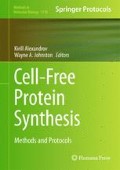Abstract
Identification of a particular protein as a physiological substrate towards kinases of interest is an extremely complex process. Under physiological conditions kinases and their putative substrates are in low abundance, and production of active eukaryotic kinases with standard overexpressing methods is an arduous task. Herein, we describe a cell-free in vitro protein translation procedure combined with fluorescent phosphoprotein staining as a simple and rapid method for identification of putative kinase substrates.
Access this chapter
Tax calculation will be finalised at checkout
Purchases are for personal use only
References
Manning G, Whyte DB, Martinez R et al (2002) The protein kinase complement of the human genome. Science 298:1912–1934
Champion A, Kreis M, Mockaitis K et al (2004) Arabidopsis kinome: after the casting. Funct Integr Genomics 4:163–187
Endo Y, Sawasaki T (2006) Cell-free expression systems for eukaryotic protein production. Curr Opin Biotechnol 17:373–380
Goshima N, Kawamura Y, Fukumoto A et al (2008) Human protein factory for converting the transcriptome into an in vitro-expressed proteome. Nat Methods 5:1011–1017
Bardoczy V, Geczi V, Sawasaki T et al (2008) A set of ligation-independent in vitro translation vectors for eukaryotic protein production. BMC Biotechnol 8:32
Otani M, Taniguchi T, Sakai A et al (2011) Phosphoproteome profiling using a fluorescent phosphosensor dye in two-dimensional polyacrylamide gel electrophoresis. Appl Biochem Biotechnol 164:804–818
van den Berg S, Lofdahl PA, Hard T et al (2006) Improved solubility of TEV protease by directed evolution. J Biotechnol 121:291–298
Acknowledgments
This work was supported by the Hungarian Scientific Research Fund and National Office for Research and Technology grant K69187 and K68160. T.M. gratefully acknowledges the support of Bolyai János fellowship.
Author information
Authors and Affiliations
Editor information
Editors and Affiliations
Rights and permissions
Copyright information
© 2014 Springer Science+Business Media, LLC
About this protocol
Cite this protocol
Nagy, S.K., Mészáros, T. (2014). In Vitro Translation-Based Protein Kinase Substrate Identification. In: Alexandrov, K., Johnston, W. (eds) Cell-Free Protein Synthesis. Methods in Molecular Biology, vol 1118. Humana Press, Totowa, NJ. https://doi.org/10.1007/978-1-62703-782-2_15
Download citation
DOI: https://doi.org/10.1007/978-1-62703-782-2_15
Published:
Publisher Name: Humana Press, Totowa, NJ
Print ISBN: 978-1-62703-781-5
Online ISBN: 978-1-62703-782-2
eBook Packages: Springer Protocols

